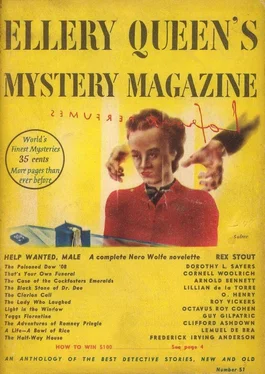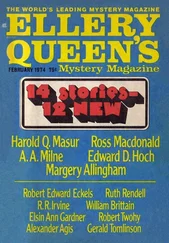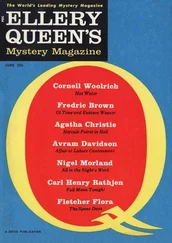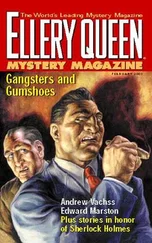Frederick Anderson - Ellery Queen's Mystery Magazine, Vol. 11, No. 51, February 1948
Здесь есть возможность читать онлайн «Frederick Anderson - Ellery Queen's Mystery Magazine, Vol. 11, No. 51, February 1948» весь текст электронной книги совершенно бесплатно (целиком полную версию без сокращений). В некоторых случаях можно слушать аудио, скачать через торрент в формате fb2 и присутствует краткое содержание. Город: New York, Год выпуска: 1948, Издательство: The American Mercury, Жанр: Классический детектив, на английском языке. Описание произведения, (предисловие) а так же отзывы посетителей доступны на портале библиотеки ЛибКат.
- Название:Ellery Queen's Mystery Magazine, Vol. 11, No. 51, February 1948
- Автор:
- Издательство:The American Mercury
- Жанр:
- Год:1948
- Город:New York
- ISBN:нет данных
- Рейтинг книги:3 / 5. Голосов: 1
-
Избранное:Добавить в избранное
- Отзывы:
-
Ваша оценка:
- 60
- 1
- 2
- 3
- 4
- 5
Ellery Queen's Mystery Magazine, Vol. 11, No. 51, February 1948: краткое содержание, описание и аннотация
Предлагаем к чтению аннотацию, описание, краткое содержание или предисловие (зависит от того, что написал сам автор книги «Ellery Queen's Mystery Magazine, Vol. 11, No. 51, February 1948»). Если вы не нашли необходимую информацию о книге — напишите в комментариях, мы постараемся отыскать её.
Ellery Queen's Mystery Magazine, Vol. 11, No. 51, February 1948 — читать онлайн бесплатно полную книгу (весь текст) целиком
Ниже представлен текст книги, разбитый по страницам. Система сохранения места последней прочитанной страницы, позволяет с удобством читать онлайн бесплатно книгу «Ellery Queen's Mystery Magazine, Vol. 11, No. 51, February 1948», без необходимости каждый раз заново искать на чём Вы остановились. Поставьте закладку, и сможете в любой момент перейти на страницу, на которой закончили чтение.
Интервал:
Закладка:
The two men, in rough homespun and with neglected beards, were wholly unconscious of the sudden alert pose of the dog. Inside, only the muffled ticking of the old clock and the faint rustling of the fire on the hearth disturbed the silence.
Grinder quietly arose, on stiff pins. Something was on the wind. Something was coming up the hill. Grinder moved stiffly to his master’s side and halted, expectant, listening. Grinder nudged his master’s wrist with his shoe-box nose, and Belden absently stroked the great dog’s head. It was incomprehensible to Grinder that these two precious foolish humans should sit here dreaming.
Belden, who was to build a bridge in the Andes, had come up here to his abandoned ancestral hulk, to be alone to think. Oliver Armiston, extinct author, now living on the royalties of a past career in fiction crime, had invited himself, saying he would be cook and bottle-washer.
If this had been the old days, there would have been excitement enough in this house by now. The thorough-brace coach, tugging up the steep grade, would announce itself with a triumphant blast of the horn. The old tire-iron still hanging from its stout gallows in the front yard, under the battered sign of the Three Crows, would moan its rhythmic lament, summoning ’ostler and maidservant. The coach and four, bound up from Hartford for Albany, would pull up at the gate on haunches; and the ladies would flutter in and gentlemen would thump pewter mugs on the cherry bar and drink to news, from north and south, which met here. But that was long, long ago. The sign, with its three crows dilapidated, still creaked on its weathered hinges; but mine host was gone, and even the road had stopped coming up that hill — or was little more than a torrent-gashed gully now.
“Queen check,” said Belden.
Grinder moved to the door and putting his muzzle to the crack, he whined. Belden rose to let the dog out. It was a nasty night; the drizzle was beginning to freeze as it fell.
Belden peered out.
“Isn’t that a motor?” he said, puzzled. There was the sound as of huge wings beating the air. As he stared at a point in the dark, two ghostly headlights appeared. The car came on slowly, feeling its way. It reached his gate, passed it.
“Hello! Hello!” cried Belden, and the dog barked. But the car continued on. Belden ran to the tire-iron, and seizing the chained sledge, hanging there since the beginning of time, struck it a blow, and the moaning thing responded with eerie clamor. The car stopped, and slowly backed to the gate.
“Hello, the house!” cried a voice; and then, “Where does this road lead?”
“Nowhere,” shouted Belden. “This is the end of it. You should have followed the river. How did you climb that hill?”
“Heaven knows!” responded the voice from the car. A searchlight picked up, in its luminous spray, Belden and the dog standing under the old gallows; then, as if endowed with a curiosity of its own, the luminous spray investigated the old gallows tree, climbed it, and came to rest on the battered sign of the Three Crows.
“Oh, a road-house!” the unseen driver exclaimed. “That’s better!”
“This isn’t a road-house. There are no accommodations here,” put in Belden.
“It isn’t? You’re displaying a sign, aren’t you?” The voice in the dark became suddenly aggressive.
“That sign has been there for a hundred and fifty years,” said Belden.
“Read Blackstone,” retorted the voice. “He settled the matter of signs — just about the time you hung that one. I believe his dictum still stands as good law. In any event, I am not going down that hill till daylight.”
“I will not go another step!” announced a woman behind the curtains. Belden fairly cringed. He must make the best of it. Oliver came up with the lantern.
“They take this for a road-house,” chuckled Belden in his ear. “Let them dream on.”
Going on ahead with the lantern, he piloted the car down the overgrown drive to the barn. Two vague figures in furs got down.
“You’ll find two bags in the rumble,” said the man.
“I’ll take one. You take the other,” said Belden, smiling to himself.
He set down the bag in the kitchen and went out to get fresh wood. When he returned the man was drawing off his gloves in front of the fire. The woman was caressing the jaunty Grinder, cheek to cheek. Laughing, she stood up and let her furs slip from her shoulders, revealing a modish outline. Her hair, prematurely white, sparkled with tiny facets of rain; her face, as round and smooth as a child’s, showed high color that suited admirably her vivacity. She held off the playful dog long enough to take stock of the room.
“Lovely!” she cried; and she clapped her little hands ecstatically. In the flickering light from the fire and the candles, with their delicate scent of bayberries, the room and its antiquated furnishings showed mellow and inviting. In her tour she came to the cherry bar.
“Is this the register?” she asked gayly, discovering an old book chained to the bar. “Are we to sign our names?”
“So the law prescribes, madam,” said Belden, opening the book at the last blank page. He took a quill pen from a drawer. She laughed, delighted, as he passed it to her.
“Who was the last one to register?” She read: “ ‘Jonathan Croyden, Gent., his lady; and two servants, one free. Thursday, fifth month, seventeenth day, eighteen fifty-four.’ ” She drew a long breath. “Eighteen fifty-four!” she repeated. “And I come next!” Then, with sparkling eyes, she wrote, in a prim hand, trying to match the chirography of the remote Jonathan Croyden, Gent.
“Business has been quiet of late years,” said Belden drolly. This to the man, who was examining the page on which the lady had written. She seized him by the lapels and turned him around.
“Isn’t it romantic! Our coming here — out of a night like this!” To Belden: “I wonder — how did Jonathan Croyden, Gent., come, with his lady, and his two servants, one free?”
“In the good coach, Lightning Express, madam.”
“Yes! In their coach and four!” she said. “And we — in our coach, and — what is it, Angus, — forty?”
“Eighty, I believe,” said the man. She burst out, dramatically:
“ ’Twas a wild night. Only knaves were abroad, on the high road!” Smiles played about her lips. “The landlord was a sur-rly fellow. He would turn us away! But... we said—” and her dancing eyes were turned upon the man beside her — “ ‘Sirr-ah, why dost thou display a sign? Dost thou not know that Blackstone — Blackstone — hath said that whosoe’er displays a sign obligates himself to provide food and lodging, for whomsoe’er may apply?’ ”
“I’m afraid I did labor under a slight misapprehension,” said the man mildly.
“My fathers kept open house here for a hundred years,” said Belden. “I could do no less, on such a night. Have you eaten?”
“Oh, yes,” replied the man comfortably. Then, for the first time, he noticed the set game of chess, and he moved over to it and sat down.
“Ah, Philidor, eh?” he said musingly. “Rather archaic, isn’t it?”
“We’re trying it out.”
“Proceed,” said the man. “I’m interested, really.”
“And might I look about?” asked the lady.
“Just where are we?” demanded the man abruptly.
“Don’t tell us,” she interjected, placing a hand over his lips. “We don’t want to know.”
The three men lapsed into the silence of chess. The woman’s little French heels beat a tattoo on the hard maple floor, as she moved from one object of adoration to another. The quiet became so profound that the three men started nervously when she asked:
“Might I look up-stairs?”
Читать дальшеИнтервал:
Закладка:
Похожие книги на «Ellery Queen's Mystery Magazine, Vol. 11, No. 51, February 1948»
Представляем Вашему вниманию похожие книги на «Ellery Queen's Mystery Magazine, Vol. 11, No. 51, February 1948» списком для выбора. Мы отобрали схожую по названию и смыслу литературу в надежде предоставить читателям больше вариантов отыскать новые, интересные, ещё непрочитанные произведения.
Обсуждение, отзывы о книге «Ellery Queen's Mystery Magazine, Vol. 11, No. 51, February 1948» и просто собственные мнения читателей. Оставьте ваши комментарии, напишите, что Вы думаете о произведении, его смысле или главных героях. Укажите что конкретно понравилось, а что нет, и почему Вы так считаете.












